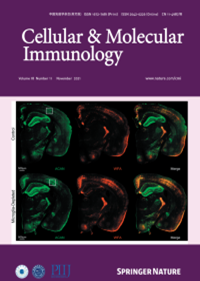Antisense to human CD39 dysregulates immune metabolism in inflammatory bowel disease
IF 19.8
1区 医学
Q1 IMMUNOLOGY
引用次数: 0
Abstract
Defective CD39 levels contribute to an imbalance between Tregs and Th17 effectors in inflammatory bowel disease (IBD). CD39 initiates an ATP hydrolysis cascade that culminates with the generation of adenosine, an immune metabolite that is key to tissue homeostasis. Human CD39 is regulated by an endogenous antisense RNA (CD39-AS) that is markedly elevated in IBD Tregs and Th17 cells. In this study, we investigated how CD39-AS affects the function of Tregs and Th17 cells in healthy subjects and IBD patients. We report that CD39-AS RNA is present in two main splice variants that are specifically expressed by Tregs or Th17 cells. Blockade of CD39-AS via self-delivering oligonucleotides targeting the splice variant expressed in Tregs results in a decrease of glucose transport and glycolysis and in enhanced Treg function and stability in IBD. In Th17 cells, silencing of CD39-AS limits oxidative responses and ameliorates mitochondrial health. These metabolic effects are also noted in a model of experimental colitis in humanized mice, along with reduced disease activity. Thus, in vivo administration of oligonucleotides targeting the Treg or Th17 cell CD39-AS variant limits disease activity, decreases the expression of GLUT1 and improves mitochondrial health in gut-derived CD4 lymphocytes. Mechanistically, activation of HIF-1α and STAT3 results in the upregulation of CD39-AS in IBD cells. In conclusion, CD39-AS is an important modulator of Treg and Th17 cell metabolism. Interference with this antisense RNA, or the factors favoring its upregulation, might contain inflammation and halt disease progression in IBD by restoring immune metabolism and Treg functional stability.

人CD39的反义蛋白在炎症性肠病中调节免疫代谢失调。
在炎症性肠病(IBD)中,CD39水平的缺陷导致Tregs和Th17效应物之间的失衡。CD39启动ATP水解级联反应,最终产生腺苷,腺苷是组织稳态的关键免疫代谢物。人类CD39受内源性反义RNA (CD39- as)调控,该RNA在IBD Tregs和Th17细胞中显著升高。在这项研究中,我们研究了CD39-AS如何影响健康受试者和IBD患者的Tregs和Th17细胞的功能。我们报道CD39-AS RNA存在于Tregs或Th17细胞特异性表达的两种主要剪接变体中。通过靶向Treg中表达的剪接变体的自传递寡核苷酸阻断CD39-AS,可减少葡萄糖转运和糖酵解,增强IBD中Treg的功能和稳定性。在Th17细胞中,CD39-AS的沉默限制了氧化反应并改善了线粒体健康。在人源化小鼠实验性结肠炎模型中也注意到这些代谢效应,同时疾病活动性降低。因此,体内给予靶向Treg或Th17细胞CD39-AS变异的寡核苷酸限制了疾病活动性,降低了GLUT1的表达,改善了肠道来源的CD4淋巴细胞的线粒体健康。在机制上,HIF-1α和STAT3的激活导致IBD细胞中CD39-AS的上调。综上所述,CD39-AS是Treg和Th17细胞代谢的重要调节剂。干扰这种反义RNA,或有利于其上调的因素,可能通过恢复免疫代谢和Treg功能稳定性来抑制炎症并阻止IBD的疾病进展。
本文章由计算机程序翻译,如有差异,请以英文原文为准。
求助全文
约1分钟内获得全文
求助全文
来源期刊
CiteScore
31.20
自引率
1.20%
发文量
903
审稿时长
1 months
期刊介绍:
Cellular & Molecular Immunology, a monthly journal from the Chinese Society of Immunology and the University of Science and Technology of China, serves as a comprehensive platform covering both basic immunology research and clinical applications. The journal publishes a variety of article types, including Articles, Review Articles, Mini Reviews, and Short Communications, focusing on diverse aspects of cellular and molecular immunology.

 求助内容:
求助内容: 应助结果提醒方式:
应助结果提醒方式:


